Services account for 70% of the US economy. Here’s what’s happening to services and retail in economic powerhouse Texas.
By Wolf Richter for WOLF STREET:
The Texas Service Sector Outlook Survey, released by the Dallas Fed on March 31, is one of the first indicators as to what services more broadly – they account for about 70% of the US economy – will look like under lockdown. The data also includes the retail sector that’s an even bigger mess.
This is based on surveys of executives of 248 companies in the Texas service sector and of 56 companies in the retail sector. The companies are unnamed. The data was collected from March 17 through 25. It was on March 19 that Texas Governor Greg Abbott issued a comparatively mild lockdown. A few days later, major cities and counties issued tighter “stay at home” orders. All this happened within the survey collection period. Some of the announcements might have come too late to be fully reflected in the survey data. Nevertheless, the results were stunningly ugly.
The Texas Service Sector Outlook Survey’s General Business Conditions Index, which reflects service sector executives’ perceptions of broader business conditions, collapsed by over 85 points to an epic all-time low of -78.8:
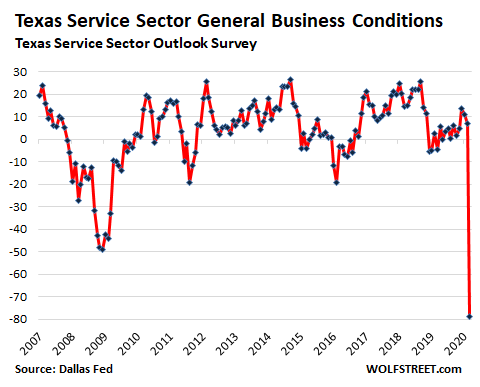
In the comments, which spanned the spectrum, one executive from the hospitality industry had this to say: “Seems pretty obvious, but due to COVID-19, our business has effectively shut down. Meetings are canceled through May, and many are trying to cancel as far out as January 2021. There is no individual transient travel occurring currently, and we have no idea how long that will continue. We have furloughed almost 90 percent of our staff.”
The revenue index of the Texas Service Sector Outlook Survey collapsed from +14.0 in February to -67.0 in March, an all-time low. Note what now just looks like a relatively small dip during Financial Crisis 1:
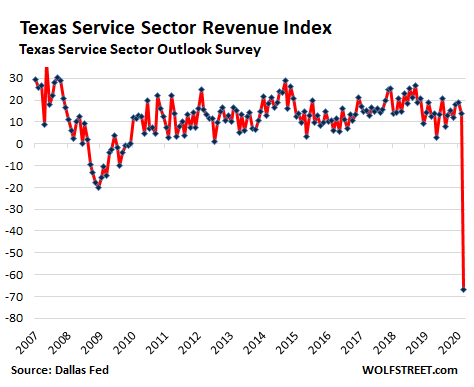
Employment contracted sharply and hours were reduced for those still employed. The employment index plunged from +6.1 to -23.8, also the lowest level on record:
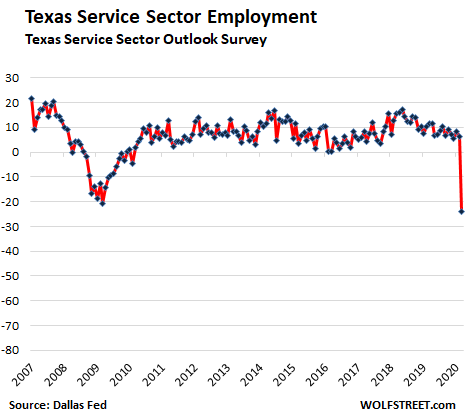
And retailers got whacked. The Retail Sales Index of the Texas Retail Outlook Survey collapsed from the already beaten-down level of -2.5 in February to an epic all-time low of -82.6 in March:
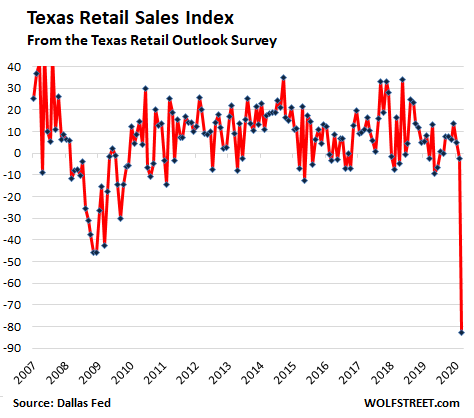
In terms of retail executives’ perception of broader business conditions, the general business activity index collapsed from the beaten down level of -5.0 to a historic low of -84.2:
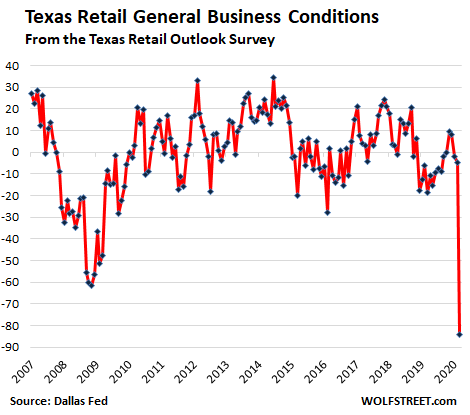
Comments from retail executives were somber. From an executive of a clothing and accessories retailer: “The majority of our stores have been forced to close due to the coronavirus.”
From a nonstore retailer: “Most of our business has gone to zero except for essential locations such as hospitals, military bases and prisons. As a vending company, we know we are ‘less essential’ to these businesses, so we anticipate our business could go to zero due to the current COVID-19 situation. We are contemplating at this moment sending most employees home while our owners determine whether they can afford to pay reduced salaries and cover benefits for a short period while we see if things improve or worsen. Most of our administrative team already has the capability to work remotely, and there will be plenty of work to keep them occupied full time, unless we need to totally shut down.”
And the retail labor market fell apart, with the employment index plunging from the already weak -1.0 in February to -28.4, which remains higher than during Financial Crisis 1 and, as the above comments suggests, appears to be lagging, as employment decisions have not all been made yet, but with more deterioration to come (as evidenced by the index of future employment, which plunged to -46.1):
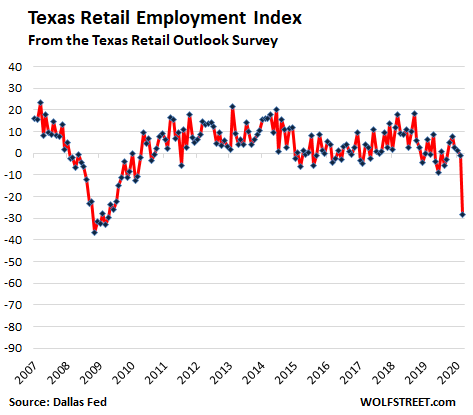
These responses from companies in the services sector and in the retail sector – while limited to Texas – give us a first inkling of how hard services and retail are getting hit. Services account for 70% of the economy and include the biggies of finance, insurance, healthcare, information and professional services – all of them with many well-paid workers.
And that outright collapse of the data in March shows the magnitude of the shock of the COVID-19 lockdowns.